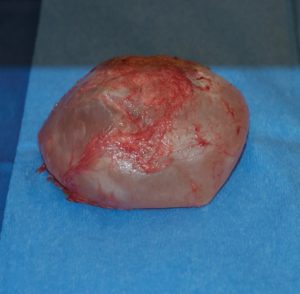
Breast Implant Illness

Breast implant illness is a term that describes a host of symptoms – ranging from fatigue, aches and pains, hair loss, memory loss, to unexplained food intolerances. It is distinct from capsular contractures and other breast implant complications, however it may be present along with other medical conditions.
A number of symptoms are similar to connective tissue/autoimmune diseases and there may be some overlap.
A concept that is starting to emerge is that of chronic inflammation as a cause of an altered immune response that can give rise to these symptoms. There are multiple causes of chronic inflammation, and every person’s body responds differently – some may “over respond” and experience enhanced symptoms.
Breast implants may be a source of chronic inflammation – not because they leach toxic substances, but due to the bodies response to their presence.
All foreign objects are coated with a biofilm – bacteria that are normally found in the body. This biofilm can be altered by “hostile” bacteria and cause inflammation – such as after an infection, dental or bowel procedure.
The constant mechanical shearing between the pectorals muscle and the implant can also be a source of inflammation.
Before considering capsulectomy and explantation, you should have a workup for common connective tissue/autoimmune diseases as well as a review of sources of chronic inflammation.
The Approach
Performed as a day surgery in Dr. Harris’ accredited facility, capsulectomy and explantation is achieved under a general anaesthetic. Drains usually are removed the following day and recovery is generally one week.
There are a number of approaches and Dr. Harris will generally perform an en bloc removal (removal of capsule and implant as one intact unit).
Everyones situation is different and anatomy, implant placement, or thickness of the capsule may not allow an en bloc procedure to be technically feasible. However, a total removal of all capsular tissue is performed regardless of the technique.
All capsular material is sent for pathologic examination, and if warranted, fluid and capsule are sent for specific CD30 immunoassay and other markers of ALCL.
Request for return of implants to the patient are done with the understanding that the implants are not sterile, are considered a biologic hazard and will grow bacteria, mold and fungi if not stored appropriately.
There may be partial OHIP coverage if your implants have ruptured or there is evidence of silicone leakage.
Additional Procedures
Patients should wait at least six months before any additional procedures such a mastopexy (lift) or contouring/fat grafting.
Many years of implants stretch and distort the breast, and if you have inflammation or capsule formation, this also causes changes. Allowing your breasts to recover usually results in elevation of the nipple without a lift – or a less invasive procedure.
You will be amazed at how well your breast will recover after capsulectomy and explantation.
Complications
In very thin women, or in very adherent capsules, there is a possibility of causing a hole in the lining between the ribs and lung leading to a pneumothorax. This is easily repaired with no lasting complications, however it may cause increased pain in the shoulder area and limit activity for a period of time after surgery.
Removal of the capsule from the underside of the muscle can also lead to adherence of the muscle on the chest wall, increased bleeding with hematoma, and breast deformities.
Dr. Harris will discuss this with you at your consultation.
